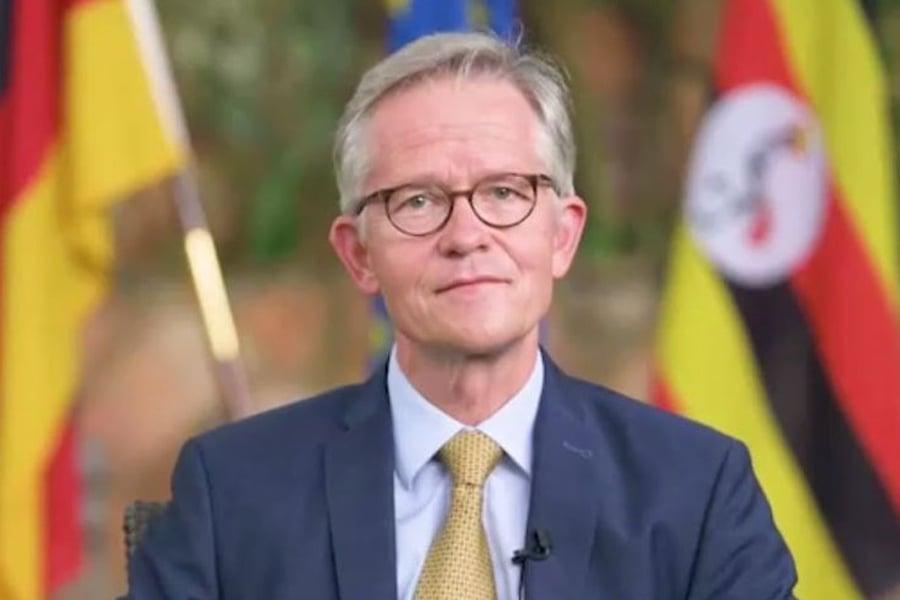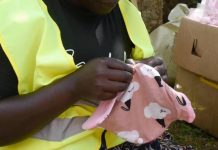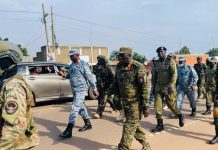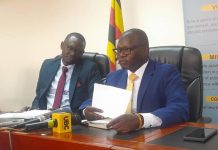Africa-Press – Uganda. Exiled Ugandan dissent writer and torture survivor Kakwenza Rukirabashaija has delivered a blistering denunciation of the European Union’s handling of Uganda’s human rights crisis, urging Brussels to impose direct sanctions on the Uganda People’s Defence Forces (UPDF) and its Chief of Defence Forces, Gen Muhoozi Kainerugaba, instead of “running to Gulu to humour his uncle.”
In a sharply worded statement posted online, the award-winning author of The Greedy Barbarian and Banana Republic: Where Writing is Treasonous dismissed as “sheer weakness” the EU delegation’s recent meeting with Gen Salim Saleh, President Museveni’s brother and a senior presidential adviser, in Gulu.
Kakwenza questioned the legitimacy of engaging Saleh, who holds no formal executive authority, as a channel for lodging diplomatic concerns.
“The @EUinUG, by travelling to Gulu to meet Mr Salim Saleh in order to complain about the CDF’s uncivilised conduct, demonstrated sheer weakness,” Kakwenza wrote.
“Is the EU now embracing Uganda’s deep state—this institutional ultra vires—where formal government structures exist merely on paper, while the Museveni family runs a parallel regime?”
The meeting, held last Wednesday, reportedly involved multiple ambassadors who conveyed alarm over inflammatory tweets by Gen Muhoozi—some of which were interpreted as direct threats to EU envoys following their visit to the opposition National Unity Platform (NUP) headquarters.
Hours later, the UPDF suspended all military cooperation with Germany, accusing its ambassador, Matthias Schauer, of subversion and alleging his involvement in supporting rebel cells—claims dismissed by NUP leader Robert Kyagulanyi, also known as Bobi Wine, as a smokescreen for regime abuses.
Kakwenza, who was abducted and tortured in 2020 and 2021 before fleeing Uganda, described the military’s retaliation against the German ambassador as emblematic of a state “frozen in anachronism” and urged the EU to stop treating the regime with kid gloves.
“Millions of Ugandans have been tortured—not only by this man [Muhoozi], but by others wielding the machinery of state: the Police, the UPDF, the so-called intelligence agencies,” Kakwenza said.
“The UPDF must be sanctioned. An international arrest warrant should be issued for cannibal Muhoozi—whether through the ICC or any other court vested with universal jurisdiction over such heinous crimes.”
His comments come amid escalating tensions between Uganda’s security establishment and some Western diplomatic missions, particularly following the UPDF’s claim that Schauer was aiding rebel elements plotting to sabotage public infrastructure.
While no evidence has been publicly presented, the move marked an unprecedented targeting of a sitting ambassador by Uganda’s military.
Kakwenza used the moment to challenge the European Union’s broader human rights stance, calling out what he described as “moral cowardice and duplicity” in its dealings with Kampala.
“Torture is prohibited under international law absolutely and is subject to universal jurisdiction. There are no grey areas,” he said.
“Yet here we are: a crook holding the office of Chief of Defence Forces boasts on Twitter about torturing a Ugandan—and your response is to drive to Gulu to lodge complaints with his uncle?”
He also called for sanctions against Uganda’s judiciary, prosecutors, and prison officials, accusing them of enabling the regime’s brutality by failing to protect torture victims and admitting detainees with visible injuries.
“Uganda’s domestic legal system is defunct,” he said. “But Uganda is party to international treaties that render sovereignty conditional—not absolute.”
European countries, Kakwenza added, are complicit in the suffering of Ugandans by continuing to sell arms to the Museveni regime while remaining publicly silent on human rights violations.
“This is not ignorance—it is complicity. Coddling despot Museveni and his batshit-brained son is not diplomacy—it is collaboration,” he charged.
The UPDF’s latest crackdown has triggered renewed concern among observers ahead of Uganda’s 2026 general elections.
Over the years, the army has routinely cited alleged rebellion plots to justify arrests, detentions, and surveillance of opposition figures.
But the naming of a European ambassador in an alleged subversive plot has intensified scrutiny over Uganda’s internal politics and international relations.
Kakwenza’s statement is likely to deepen the discomfort in diplomatic circles. While the European Union has occasionally raised concerns about Uganda’s human rights record, it has maintained development and military partnerships, including support for Uganda’s role in regional peacekeeping missions.
“The EU’s integrity must not be bartered for access or influence,” Kakwenza said.
“The EU–Uganda relationship must be anchored in or bound by shared values. But what values do you share with systematic human rights violators?”
The European Union has yet to respond publicly to either the UPDF’s suspension of cooperation with Germany or Kakwenza’s criticism. The German Embassy in Kampala has also not issued a statement.
Meanwhile, the Patriotic League of Uganda (PLU), a pro-Muhoozi pressure group, has announced plans for a “peaceful demonstration” outside the German Embassy in Kampala on June 5 to protest what it termed foreign interference.
The PLU’s formation and recent activism have fuelled speculation about Muhoozi’s presidential ambitions, even as critics point to growing militarisation and clampdowns on dissent.
Kakwenza, who until recently lived in Germany, ended his statement with a warning to Western governments: “If the dictator did not enjoy your support, he would not have the impunity to oppress us. He uses your silence and your money to keep us under the boot—and we are tired.”
For More News And Analysis About Uganda Follow Africa-Press






